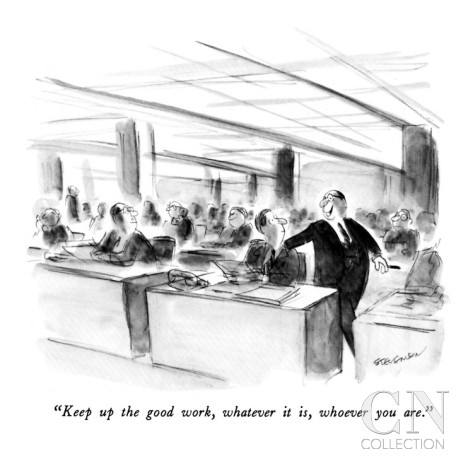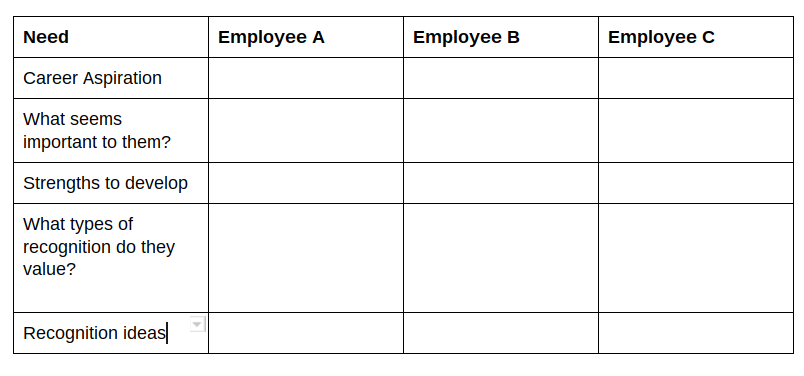You can do the best job ever as a recruiter. Slay it. Kill all your numbers. Get all the A-Players in your market — and other markets. But even if you’re out there consistently putting the bar up, you’ll be seen as a crappy recruiter over time if your new hires keep entering the organization, getting no recognition, and leaving sometime in the first 18 months. Eventually, as you reach out to new candidates, they’ll have heard from their friends that your placements often end up in frustration.
Now your personal brand is suffering.
Why does this happen? Because for as much money as we put into recruiting, we don’t put the same amount of thought and context into the next steps: on boarding, better management, and working to recognize and reward employees.
And listen, I totally understand that not every organization is a bank. Not everyone can be a VP. Not everyone can get promoted every year and have the high-ass salary. I get all that. But there are other ways you can reward people and recognize them for their accomplishments. One simple way, mentioned by my colleague at RD Ted Bauer, is simply to acknowledge what’s happening in their lives.
And yes, there are reward and recognition suites out there, software-wise. Reward Gateway is one example, and we’ve previously looked at some of their approaches to improve both recruiting and engagement. There are other solutions on the market too. We’ve done some work with Namely and some of the others on this list in the past. Solutions are definitely out there.
But it all begins with, well, caring.
The landscape
There are roughly 2,400 Google searches per month for ’employee recognition ideas.’ That’s really not that many when you consider how many people are managers/bosses in the world, and the low volume shouldn’t be too surprising. In The Carrot Principle, they discuss one particular set of employee recognition ideas. Let me set this up for you. They refer to another book, Hardwiring Excellence, and four questions you can ask an employee at 90 days. (More on why 90 days is relevant in a second.) The four questions are all good ones:
- Have we lived up to our promises to you?
- What do you think we do best?
- What have you seen in your other jobs that might work here?
- Have we done anything in 90 days where you might consider leaving?
These four questions are awesome to ask at the three-month mark. It’s all about showing the employee you value them. It’s an easy, cost-effective version of employee recognition ideas. So in various studies around these four questions, consultants have asked employees one simple question:
- Has your manager ever asked you any of these four questions?
In years and years of asking that question, they’ve never heard the word “yes.”
And here we are at the problem with employee recognition ideas.
Employee recognition ideas: Why do they matter?
I could throw a million and five surveys at you here. I won’t. Here’s the basic deal. People want a nice salary, yes, but they also want respect and opportunities for growth at work. Those are the big things. If you’re a relatively smart person and you enter a company with 16 people in the C-Suite (“Chief Fun Officer”), you realistically know there’s a hard ceiling on how much money you can make. As a result, you need other things to be working for you. A big one is respect and acknowledgement. You may have seen this old New Yorker cartoon:
That’s how many (not all) bosses approach work. When you work for a boss like that, you ultimately want to leave — even if you’re making bank. We’re social animals and we like unique breakdowns of our, well, uniqueness. When managers don’t recognize, we care less. It’s happened to me every single place I’ve ever worked. It’s probably happened to you once or twice too.
In some ways, ’employee recognition ideas’ is very closely connected to ‘feedback.’ Feedback is almost never given at offices, and everyone and their mother has 121 excuses why not. In fact, let’s address that now.
Employee recognition ideas: The excuses
There are probably over 100 excuses managers give for lack of employee recognition ideas. Some of the main ones:
- “I’m too busy.”
- “It will be inconsistent.”
- “I will recognize them in review season.”
- “Our goal is to hit targets and make money.”
- “I am afraid of showing favoritism.”
- “It is too expensive to keep giving them Starbucks gift cards.”
- “I don’t want them to get complacent in their role.”
- “I don’t need to recognize them for doing their job.”
Every single excuse above is complete bullshit. I could go one-by-one and debunk them, but that might waste your time — and look at No. 1! You’re busy! (But are you productive?)
Here’s one way to consider it. Work and relationships are not the same thing (i.e. friends/family). But if you were in a friendship where the other person never recognized you whatsoever, would you stay in that friendship for long? Probably not. And yet, at work that’s completely acceptable and oftentimes commonplace. And then we write 673,812 ‘thought leadership’ articles about the decline of employee engagement.
Let me keep this real simple: employee engagement is down because most bosses are focused more on hitting targets than on their people. They have no employee recognition ideas. Their primary idea is often “Let me get recognized by my boss.” That mentality is pervasive.
That’s why employee engagement is down. Plain and simple. OK, now let’s move forward.
Employee recognition ideas: A simple example
Let’s try a simple example of something you could do as a manager. Look at this chart:
Now, replace “Employee A” and so on with actual people’s names. But you see the concept here? You keep notes on different employees. You start by caring about their career goals! Also learn what’s important to them, what strengths they need to develop, etc. It’s a very basic chart.
If you’re too busy worshiping at the Temple of Busy, do this for 3-4 weeks. See how it goes. Each week, try to find one positive per employee and quickly note it to them with a visit to their desk area. At four weeks, evaluate your relationship with them and their productivity. I’d guess both are on the up.
This is an important example of employee recognition ideas because it costs nothing. It just requires a manager with some observational skills and 10 minutes a week to record what he/she observes. No movie passes here, guys! And it probably works better than that, honestly.
Employee recognition ideas: How do we get better?
Couple of quick ideas here:
Leadership Tracks: One of the biggest problems with American business is why people choose to become managers. Why is that? In most companies, it’s the only way to make more money. A person who is pursuing more money is often (not always) going to be a less empathetic soul and thus (again, not always) probably not a great manager of others. But they have to become a manager to get that money. We need two tracks: people managers and ICs. You can make the same money on either track. Most companies would never do this, but it prevents the true target-chasing assholes from managing others. When a jackass manages other people, it has repercussions for the whole team/department.
Start by caring: You can say this about anything in life or business, and definitely about employee recognition ideas.
Tie it more to the bottom line: This is how decision-makers will give a crap. Basically, show them this math: with employee recognition ideas, people are working harder. The company is more productive. And yet, we don’t have to give as many raises and people are staying. So, less raises + less turnover = more scratch for the execs, and more people covering their ass. Execs will love that bouncing ball. In fact, in Lederman’s new book Crave, there’s a worksheet at the back about how to convince executives that this stuff matters.
Care: Did I mention this one?
Employee recognition ideas: What you got?
If you’ve ever had a job and/or a boss, what has he/she done for you that resonated? Talk to me about some employee recognition ideas if you come across this post. I’d love to know more.
Authors
Ryan Leary
Ryan Leary helps create the processes, ideas and innovation that drives RecruitingDaily. He’s our in-house expert for anything related to sourcing, tools or technology. A lead generation and brand buzz building machine, he has built superior funnel systems for some of the industries top HR Tech and Recruitment brands. He is a veteran to the online community and a partner here at RecruitingDaily.
Recruit Smarter
Weekly news and industry insights delivered straight to your inbox.







